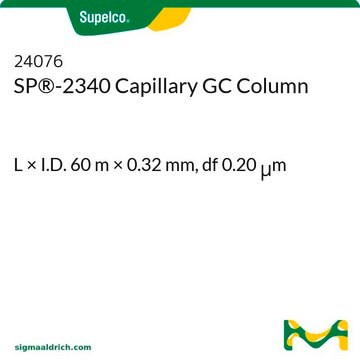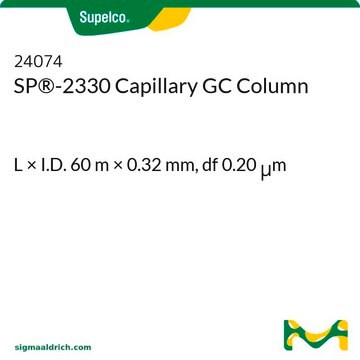24023
SP-2340
L × I.D. 60 m × 0.25 mm, df 0.20 μm
Se connecterpour consulter vos tarifs contractuels et ceux de votre entreprise/organisme
About This Item
Code UNSPSC :
41115710
eCl@ss :
32119290
Produits recommandés
Matériaux
fused silica
Agence
meets requirements for USP G5
Paramètres
≤25-250 °C temperature (isothermal or programmed)
Valeur bêta
313
df
0.20 μm
Technique(s)
gas chromatography (GC): suitable
L × D.I.
60 m × 0.25 mm
Groupe de la matrice active
Non-bonded; poly(biscyanopropyl siloxane) phase
Type de colonne
capillary highly polar
Vous recherchez des produits similaires ? Visite Guide de comparaison des produits
Catégories apparentées
Description générale
SP®-2340 is a cyanopropylsiloxane stationary phase, and has high polarity and temperature resistance.
Application: This non-bonded column offers the highest polarity in its class. As with all general purpose biscyanopropyl columns, it is highly effective for both high and low temperature separations of geometric isomers of fatty acid methyl esters (FAMEs), dioxins, carbohydrates, and aromatic compounds.
USP Code: This column meets USP G5 requirements.
Phase:
USP Code: This column meets USP G5 requirements.
Phase:
- Non-bonded
- Poly(biscyanopropyl siloxane)
- Subambient to 250 °C (isothermal or programmed)
Application
Capillary column coated with SP®-2340 stationary phase may be used in gas chromatographic analysis and separation of cis/trans isomeric fatty acids.
Autres remarques
We offer a variety of chromatography accessories including analytical syringes
Informations légales
SP is a registered trademark of Sigma-Aldrich Co. LLC
Faites votre choix parmi les versions les plus récentes :
Déjà en possession de ce produit ?
Retrouvez la documentation relative aux produits que vous avez récemment achetés dans la Bibliothèque de documents.
Les clients ont également consulté
SP 2340 in the glass capillary chromatography of fatty acid methyl esters.
Heckers HF
Journal of Chromatography A, 136 (2), 311-317 (1977)
Mikael Harju et al.
Journal of chromatography. A, 1019(1-2), 111-126 (2003-12-03)
Comprehensive two-dimensional gas chromatography (GC x GC) of the 209 polychlorinated biphenyls (CBs) was carried out using a longitudinally modulated cryogenic system (LMCS) and liquid carbon dioxide as cryogen. The effluent from a non-polar column was modulated and further separated
T W Lee
Journal - Association of Official Analytical Chemists, 70(4), 702-705 (1987-07-01)
A method has been developed for the quantitative determination of linoleic acid in infant formulas by gas chromatography (GC). A known amount of triheptadecanoin was spiked into the sample. Total lipid was extracted from the product by an ethyl ether-petroleum
R H Thompson et al.
Lipids, 16(9), 694-699 (1981-09-01)
Paris of C-24 epimeric sterols have been very difficult to separate by physical emthods. We report here the partial or complete separation of the trimethylsilyl ethers of nine pairs of C-24 epimeric sterols by gas liquid chromatography on a glass
C F Poole et al.
Journal of chromatography. A, 912(1), 107-117 (2001-04-20)
The solvation parameter model is used to study the influence of temperature and composition on the selectivity of nine poly(siloxane) and two poly(ethylene glycol) stationary phase chemistries for open-tubular column gas chromatography. A database of system constants for the temperature
Notre équipe de scientifiques dispose d'une expérience dans tous les secteurs de la recherche, notamment en sciences de la vie, science des matériaux, synthèse chimique, chromatographie, analyse et dans de nombreux autres domaines..
Contacter notre Service technique









